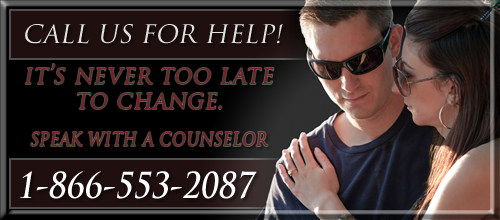About Drug Addiction
- Teen Drug Addiction
- Understanding Drug Addiction
- Effects of Drug Addiction
- Dangers of Drug Addiction
- Stages of Drug Addiction
- Signs of Drug Addiction
- Drug Addiction Withdrawal
- Drug Addiction Relapse
- Drug Addiction Facts
- Drug Addiction Overdose
- Drug Addiction Help
- Drug Addiction Intervention
- Drug Addiction Detox
- Drug Addiction Treatment
- Drug Addiction Rehab
- Drug Addiction Counseling
- What is a Drug Addict
- Drug Addiction Information
- Drug Addiction Statistics
- Drug Addiction Testing

Drug Addiction Relapse
 Drug addiction relapse is frequently part of an individual's recovery process from drug addiction to lasting sobriety. A drug addiction relapse is when a person who has been clean for a period of time starts using again. This can be just an one time slip up in their sobriety or a long lasting stint of drug abuse as well as anything in between.
Drug addiction relapse is frequently part of an individual's recovery process from drug addiction to lasting sobriety. A drug addiction relapse is when a person who has been clean for a period of time starts using again. This can be just an one time slip up in their sobriety or a long lasting stint of drug abuse as well as anything in between.
Alan Leshner, Ph.D., director of the National Institute on Drug Abuse (NIDA), says that it is not reasonable to expect that drug addicts will obtain lifelong abstinence with their first treatment experience. "Even if [addicts] are treated successfully, often there will be occasional relapses." Neuropharmacology professor George Koob, M.D., of the Scripps Research Institute in La Jolla, California, agrees. He estimates that 80 percent of addicts who get off drugs in detoxification go back to drugs within a year. Only 20 percent achieve a stable abstinence from a given detoxification program.
Understanding why recovering addicts are susceptible to drug addiction relapse is a major field of research regarding drug addiction recovery. One key reason researchers feel drug addicts relapse is due to their drug cravings. These cravings can be described as a "hunger" for drugs and can continue for months if not years after the individual has quit using. Scientists have discovered evidence that these cravings may be partly a physiological phenomenon, related to the long-term changes in brain function that addiction causes. Now accustomed to functioning in the presence of drugs, the addicted brain, in essence, has become unable to function normally in their absence.
As mentioned before, drug addiction relapse is the act of taking that first drink or drug after being deliberately clean and sober for a period of time. However, it often helps to view relapse as a process that began long before that first act. Those who have relapsed can often look back and pinpoint specific things they thought or did long before they actually took drugs that eventually caused their relapse. Examples include becoming complacent in their recovery program in some way or refusing to ask for help when they need it. Each person's relapse factors are unique to them, their drug addiction, and personal plan of recovery.
Not surprisingly, unhappy events can trigger a drug addiction relapse as well. Risk factors are very much individualized. When addicts are overwhelmed by external triggers, such as losing a job, problems with their spouse, or even bad weather for a couple of days, they can relapse. Health-related issues, academic problems, and difficulties with friends or family are all potential risk factors for a relapse.
When it comes to strong thoughts of using drugs, almost every individual in recovery has experiences these. It is not uncommon for recovering individuals to experience drug using dreams. As hard as these using dreams may be, they can be used as a tool. They can remind the individual how far they have come in their recovery process and how many problems in their life were caused by their using. Recovery from drug addiction takes time and effort. As each day goes by, the cravings, using dreams, and the uncertainties of complete recovery from drug addiction will diminish. Below are the ten most common drug addiction relapse dangers to watch out for.
The Ten Most Common Drug Addiction Relapse Dangers:
- Being in the presence of drugs or alcohol, drug or alcohol users, or places where you used or bought drugs.
- Feelings we perceive as negative, particularly anger; also sadness, loneliness, guilt, fear, and anxiety.
- Positive feelings that make you want to celebrate.
- Boredom.
- Getting high on any drug.
- Physical pain.
- Listening to "war stories" (using stories) and just dwelling on getting high.
- Suddenly having a lot of cash.
- Using prescription drugs that can get you high even if you use them properly.
- Believing that you no longer have to worry (complacent). That is, that you are no longer stimulated to crave drugs/alcohol by any of the above situations or by anything else - and therefore maybe it's safe for you to use occasionally.
Drug Addiction
- Alcohol Addiction
- Adderall Addiction
- Ativan Addiction
- Cocaine Addiction
- Crack Addiction
- Ecstasy Addiction
- Heroin Addiction
- Lortab Addiction
- Marijuana Addiction
- Meth Addiction
- Methadone Addiction
- Morphine Addiction
- OxyContin Addiction
- Percocet Addiction
- Ritalin Addiction
- Vicodin Addiction
- Xanax Addiction
